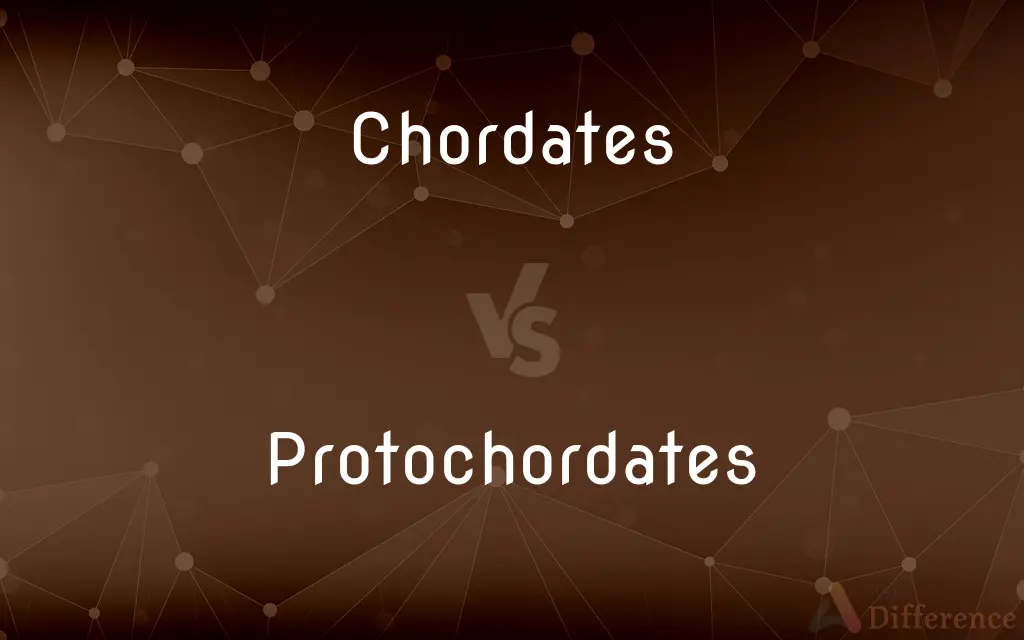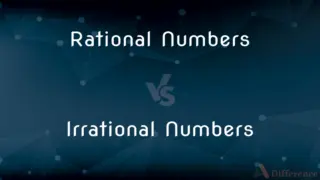Chordates vs. Protochordates — What's the Difference?
By Tayyaba Rehman — Published on December 16, 2023
Chordates possess a notochord throughout or at some life stages, while protochordates are simple organisms that exhibit chordate features only during specific life phases.

Difference Between Chordates and Protochordates
Table of Contents
ADVERTISEMENT
Key Differences
Chordates are a diverse group of animals that have, at some stage of their life, a notochord, dorsal nerve cord, pharyngeal slits, and post-anal tail. Protochordates, on the other hand, are primitive organisms that show these chordate features only during certain life stages.
While chordates can be vertebrates or invertebrates, protochordates are exclusively invertebrates. Chordates, therefore, include animals like fish, amphibians, reptiles, birds, and mammals, whereas protochordates are restricted to more simplistic organisms.
Both chordates and protochordates are essential in understanding evolutionary biology. Chordates provide a comprehensive view of vertebrate evolution, while protochordates give insight into the evolutionary steps from invertebrates to vertebrates.
Chordates have a more complex body plan and organization compared to protochordates. The diversity within chordates is extensive, leading to a myriad of habitats, behaviors, and adaptations. Protochordates, in contrast, have a limited scope in terms of variety and complexity.
The primary distinction between chordates and protochordates centers on their evolutionary and biological complexity. Chordates represent a more advanced stage of evolution, whereas protochordates stand as a bridge between invertebrates and vertebrates in the evolutionary spectrum.
ADVERTISEMENT
Comparison Chart
Complexity
More complex body organization
Simpler body organization
Vertebrates/Invertebrates
Can be either
Exclusively invertebrates
Examples
Fish, amphibians, reptiles, birds, mammals
Lancelets, tunicates (sea squirts)
Evolutionary Position
More advanced evolutionarily
Intermediate between invertebrates and vertebrates
Presence of Features
Throughout or at specific life stages
Mostly during specific life stages
Compare with Definitions
Chordates
Chordates are animals possessing a notochord at some stage of their life.
Humans, as chordates, have a notochord during embryonic development.
Protochordates
Protochordates are exclusively invertebrate animals.
Unlike chordates, protochordates such as lancelets never develop a backbone.
Chordates
Chordates include both vertebrates and certain invertebrates.
While fish and mammals are chordates, so are some simpler organisms like lancelets.
Protochordates
Protochordates are critical in understanding the fundamental characteristics of the chordate lineage.
The simple body plan of protochordates offers a snapshot into the early stages of chordate evolution.
Chordates
Chordates exhibit certain derived features, including a post-anal tail and pharyngeal slits.
The presence of pharyngeal slits in embryonic stages confirms the chordate lineage of many animals.
Protochordates
Protochordates serve as a bridge in evolution between invertebrates and vertebrates.
Studying protochordates provides clarity on the evolutionary leap from simple to complex organisms.
Chordates
Chordates play a pivotal role in understanding vertebrate evolution.
The study of chordates offers insights into the evolutionary paths of many animals, including humans.
Protochordates
Protochordates are primitive animals showcasing chordate features during specific life stages.
Tunicates, as protochordates, exhibit chordate features during their larval stage.
Chordates
Chordates encompass a vast array of species with diverse habitats and behaviors.
From the deep-sea fishes to soaring birds, chordates have conquered every conceivable habitat.
Protochordates
Protochordates predominantly reside in marine environments.
Many protochordates, like tunicates, are commonly found attached to underwater substrates.
Chordates
Any of numerous animals of the phylum Chordata, having at some stage of development a dorsal nerve cord, a notochord, and gill slits and including all vertebrates, the hagfishes, and certain marine animals such as the lancelets and the tunicates.
Protochordates
Plural of protochordate
Chordates
Plural of chordate
Common Curiosities
Why are protochordates important in evolutionary biology?
Protochordates serve as a transitional group, showcasing the evolution from invertebrates to vertebrates within chordates.
Do humans belong to the chordate group?
Yes, humans are chordates as they exhibit chordate features during embryonic development.
Do protochordates have a backbone?
No, protochordates are invertebrates and lack a backbone.
Are chordates found exclusively in water?
No, while some chordates are aquatic, many, including mammals and birds, inhabit terrestrial environments. Most protochordates are marine.
How are chordates and protochordates related in the evolutionary tree?
Chordates represent a more advanced stage in evolution, while protochordates are seen as an intermediate step between invertebrates and vertebrates.
Are protochordates considered to be true chordates?
While protochordates exhibit chordate features, they are not considered true chordates due to their limited expression of these features.
Are all chordates and protochordates marine?
Not all chordates are marine, but most protochordates reside in marine environments.
What are some examples of protochordates?
Examples of protochordates include lancelets and tunicates (sea squirts).
What are the defining features of chordates and protochordates?
Chordates possess features like a notochord, dorsal nerve cord, pharyngeal slits, and post-anal tail at some life stage; protochordates exhibit these features primarily during specific life phases.
Are all chordates vertebrates?
No, while many chordates are vertebrates, some like lancelets are invertebrates. Protochordates, however, are always invertebrates.
How are chordates and protochordates different in terms of complexity?
Chordates have a more complex body organization, while protochordates are simpler in structure.
Are there chordates that do not develop into vertebrates?
Yes, some chordates like lancelets remain invertebrates throughout their lives.
Why are chordate features significant in classification?
Chordate features, like the notochord, are evolutionary traits that provide insights into the ancestry and development of an organism.
Share Your Discovery

Previous Comparison
Supply vs. Quantity Supplied
Next Comparison
Rational Numbers vs. Irrational NumbersAuthor Spotlight
Written by
Tayyaba RehmanTayyaba Rehman is a distinguished writer, currently serving as a primary contributor to askdifference.com. As a researcher in semantics and etymology, Tayyaba's passion for the complexity of languages and their distinctions has found a perfect home on the platform. Tayyaba delves into the intricacies of language, distinguishing between commonly confused words and phrases, thereby providing clarity for readers worldwide.














































